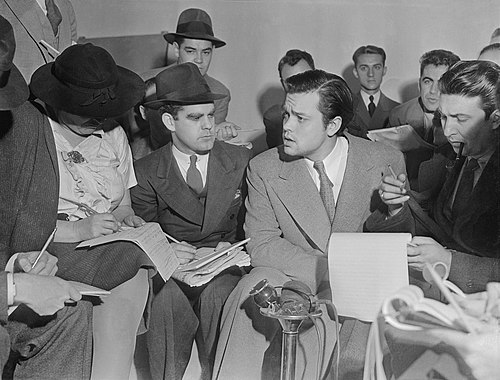Orson Welles (May 6, 1915 – October 10, 1985) was an American actor, director, screenwriter, and producer who is remembered for his innovative work in film, radio, and theatre. After various theatre roles in Ireland, England and the United States as well as acting on radio shows, Welles began directing stage productions for the
Federal Theatre Project at the age of 21. These included the
Voodoo Macbeth (1936) and
The Cradle Will Rock (1937). His first film was
Citizen Kane (1941),
which he co-wrote, produced, directed and starred in as the title character,
Charles Foster Kane. It has been consistently ranked as
one of the greatest films ever made. Welles directed twelve other features, including
The Magnificent Ambersons (1942),
The Lady from Shanghai (1947),
Othello (1951),
Touch of Evil (1958),
The Trial (1962),
Chimes at Midnight (1966), and
F for Fake (1973). Welles's distinctive directorial style featured layered and
nonlinear narrative forms, dramatic lighting, unusual camera angles, sound techniques borrowed from radio,
deep focus shots and
long takes. He received an
Academy Award and three
Grammy Awards, among other honors. This photograph, taken in 1938, shows Welles surrounded by reporters and discussing his radio drama "
The War of the Worlds", which had induced panic among some listeners who believed that a real
Martian invasion was taking place.
Photograph credit: Acme News Photos


